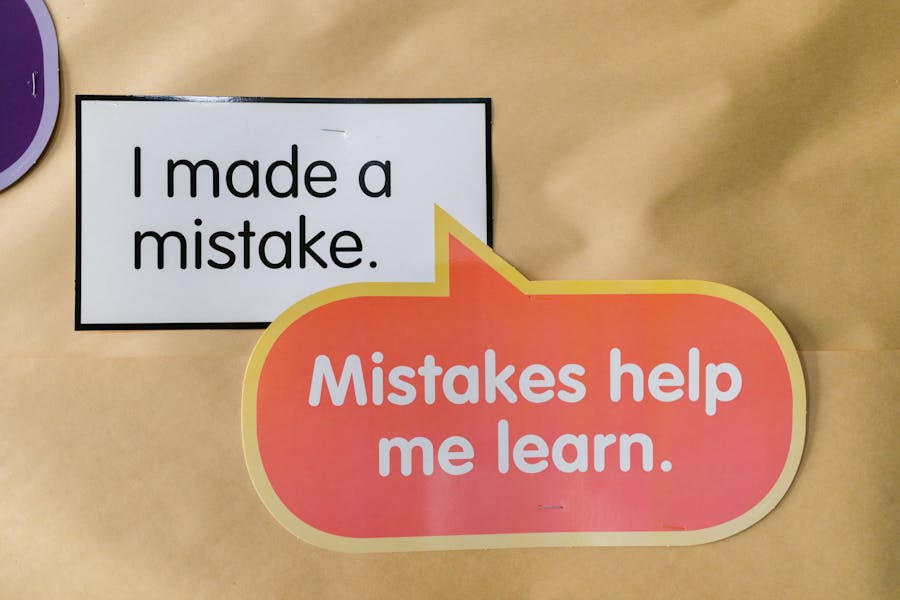
Commonalities Between Failures and Mistakes
Studying hard for a test and getting a lower grade than expected. Feeling great after a job interview, only to find out someone else was awarded the position. Showing love and kindness to someone, only for that person to treat you poorly in return. When you fail in reaching a particular standard, goal, or outcome oftentimes feelings of inadequacy and self-deprecation rise to the surface of the psyche.
Lying to someone. Yelling at your kids, even though you always tell them to calmly talk things out with others. Eating a sleeve of Oreos, knowing you will most likely have a stomachache afterwards. Making mistakes also yields sentiments of internal negativity that may cause you to have a poor perception of your true nature.
Failures and mistakes are just two of many threads woven into the fabric of the human condition. Regardless of differences in people’s values, appearances, and socio-economic statuses they are a shared commonality in everyone’s life experiences. Typical emotional responses to failures and mistakes include, but are not limited to,: pain, rejection, self-loathing, self-doubt, anger, fear, embarrassment, disappointment, shame, and guilt. The Merriam-Webster Dictionary describes “failure” and “mistake” with negative words and phrases such as, “deficient;” “to be unsuccessful”, “to become inadequate”, “wrong”, and “blunder.” In reading those definitions it is no wonder we affix discouraging labels to ourselves in the aftermath of such circumstances. Unfortunately, many of us allow these instances to define who we are– our character, abilities, and capabilities. Negative self-talk can hinder people from ultimately believing that setbacks may actually be setups for future successes.
Change Your Definitions of Failure and Mistakes
When you encounter any obstacle the way you frame your thinking will determine how you proceed both mentally and emotionally. You have a choice on how you define “failure” and “mistakes.” What if a failure or mistake is actually just remaining stagnant after enduring turmoil? Although the dictionary’s explanations provide matter-of-fact meanings for both words, there is the option to assign inspirational definitions as well. For example, what if you define “failure” as, ” a FALL that you will get back up from”? What if you redefine it as having TEMPORARY difficulty accomplishing a motive? Additionally, you can designate a “mistake” as a “MESS that can be cleaned up.” Your next mistake could be an action, decision, or judgment that may have been erroneous, but is fixable. Choose to change the narrative.
6 Reasons Failures and Mistakes Are Good for Growth
What if failures and mistakes are actually blessings bestowed upon you to enhance personal growth? There are times when adverse situations actually create the greatest results. For the same reasons pencils have erasers to get rid of wrong answers, you can rewrite what happens next in your endeavor. You just have to withstand the process. Here are 6 reasons proving that failures and mistakes contribute to a growth mindset:
1. You Learn.
Failures and mistakes offer insightful lessons which enhance critical thinking skills. You can use this opportunity to problem-solve and evaluate what issues need to be remedied and then apply these newly discovered solutions into your next steps toward accomplishing your intended outcome. You may acquire new perspectives or tap into creative outlets that you may never have uncovered otherwise. Realizing what went wrong will help make things right in your future performance.
2. You Build Resiliency.
Each time you endure hardships your capacity to withstand and cope with them becomes strengthened. Your psychological well-being remains optimistic, regardless of the circumstances, in bouncing back from the situation. You persevere and continue to work through the complications. You learn to become comfortable with the uncomfortable, empowering you to move forward toward improvement rather than remaining stagnant in a mire of negativity.
3. You Cultivate Bravery.
You show courage and fortitude every time you take a chance in making progress. You choose to push through fears, vulnerabilities and shame. You are not intimidated by the risk of going through a painful experience again, especially if it means you are another step closer in your growth journey.
4. You Self-Reflect.
Challenges present you a chance to dive in and analyze your thoughts, behaviors, and emotions. When you contemplate and become aware of why you do the things you do or why you feel the way you feel, you gain more clarity on how to proceed in upcoming situations. You recognize your strengths and also areas that may need improvement. Self-reflection aids you in devising a follow-up plan that is armed with focused intention and greater objectivity.
5. You Gain Humility.
Setbacks, complications, and errors are inevitable aspects of life. While you navigate the tough times, you are given the chance to acknowledge the imperfections of your humanity and relinquish any sense of pride or superiority in how you view others. In fact, humility helps deter you from judging people and fosters empathy for those experiencing their own dilemmas. Additionally, after identifying the behaviors or actions that may need revamping, you become more humble in seeking help, criticism and advice from other sources.
6. Delayed Gratification Is More Rewarding Than Instant Gratification.
Denials may just be delays. In keeping vigilant and embracing your mistakes and failures, you will relish the times in which you earn a victory. You will be inundated with positive emotions such as fulfillment, relief, empowerment, and appreciation. Considering you exhibited patience, determination, and resilience throughout the process you bask in appreciation of the long-awaited glory of your achievement.
Revise your definitions of “failures” and “mistakes” to include the notion that both are key factors in the learning process and are useful components in your journey of self-improvement and growth.


